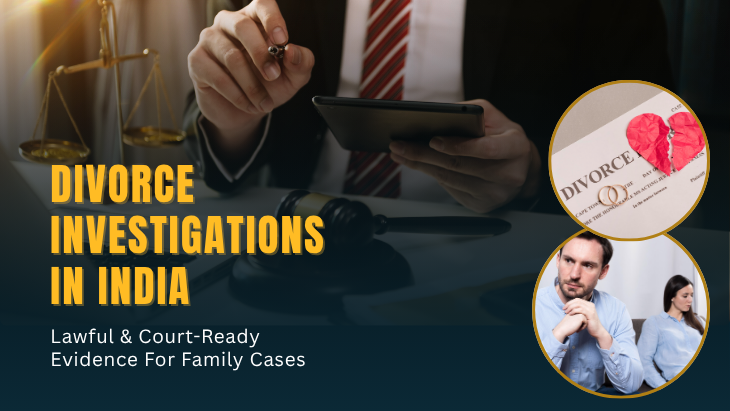When a marriage breaks down, emotions run high. Courts don’t rule on emotions—they rule on facts. A well‑planned, lawful divorce investigation helps you move from suspicions to evidence: clear timelines, corroborated findings, and documentation your counsel can use with confidence. If you’re weighing custody, maintenance, or property issues, this guide explains what a professional investigation can (and cannot) do, how evidence is collected ethically, and how to choose the right team.
What a Divorce Investigation can Cover (Lawfully)
Every case is different, but common workstreams include:
- Child welfare and custody
- Daily routine, school attendance, caregiver reliability, living conditions, exposure to conflict or harmful environments, and substance misuse risk (observational, third‑party checks).
- Lifestyle and conduct (including suspected infidelity)
- Lawful, discreet observation to document patterns like cohabitation, regular overnight stays, or conduct relevant to alimony/maintenance claims. Direct “gotcha” moments are rare; consistent timelines matter more.
- Financial and asset verification
- Public‑domain and lawful records of businesses, directorships, properties, vehicles; signs of concealment or under‑reporting routed through counsel for disclosure or court orders as needed.
- Digital footprints (OSINT—not hacking)
- Social profiles, public posts, event tags, geotag clues in public photos; preservation of public content with timestamps and context.
- Harassment, threats, or abuse documentation
- Medical records (via you/your counsel), police entries, protection orders, and lawful documentation of messages received.
- Substance use patterns
- Observations and third‑party inputs that may affect custody or safety; toxicology only through lawful medical processes when courts order.
Important Legal and Ethical Lines
Good investigators work inside the law. That protects you and your case.
- No illegal interception (calls, messages), no “call detail records,” no hacking
- No planting devices, no unlawful audio/video recording in private spaces
- Respect privacy rights (e.g., Puttaswamy judgment) and data protection obligations (DPDP Act 2023 in India)
- Evidence handled to Indian Evidence Act standards (or your jurisdiction’s rules)
- Use your lawyer for discovery/subpoenas—not shortcuts
If an “agency” offers hacked data or secret recordings from private spaces, walk away. It’s illegal, risky, and likely inadmissible.
👉 Looking for a trusted pre matrimonial investigation agency in India? Get discreet, evidence-based reports before or after marriage.
How a Professional Divorce Investigation Works
Private intake and goal‑setting
- You share the issues (custody, maintenance, property, conduct). The investigator listens, clarifies objectives, and flags legal sensitivities.
Plan and risk controls
- Written scope: what will be done, where, when, and how often. Clear boundaries, safety plans, and who gets updates. Coordination with your counsel from day one.
Collection (discreet and proportionate)
- Field observation in public spaces, site visits, neighbor/reference checks, OSINT, and lawful record pulls. If technical work (e.g., hidden camera checks) is relevant, it’s scoped and handled by a TSCM specialist.
Verification
- Triangulate findings across independent sources. Align with dates, locations, and publicly available records. Keep a timeline.
Reporting you can use
- Decision‑grade write‑up: executive summary, methods used, findings with dates and times, photos (where lawful), annexures, and recommendations on next legal steps.
Testimony and handoff
- If required, the investigator can brief counsel and testify. Evidence is stored with chain‑of‑custody.
What “Winning” Looks Like in Family Court
Family courts typically value:
- Patterns over isolated incidents (e.g., repeated late‑night drop‑offs, consistent cohabitation)
- Neutral corroboration (school records, third‑party logs, hotel billing in the party’s own name, publicly visible check‑ins)
- Child‑focused documentation (stable routine, safe environment, supportive caregivers)
- Transparent financial pictures (no surprise businesses or properties discovered at the eleventh hour)
They typically discount:
- Anonymous screenshots with no provenance
- Illegally obtained recordings or hacked information
- Sensational claims without dates, witnesses, or context
Costs, Timelines, and Deliverables
- Timelines
- Focused verification (e.g., two or three key dates): 1–2 weeks
- Custody‑oriented routine checks: 2–6 weeks to establish patterns
- Asset and financial mapping (public records + counsel‑led discovery): staged over weeks
- Pricing
- Fixed fee for defined tasks (school run checks, address verification, targeted observations)
- Day‑rate/retainer for open‑ended or multi‑city work
- Add‑ons for specialist inputs (TSCM, digital forensics via consent/court order)
- Deliverables
- Written report with summary and detailed timeline
- Photographs/video captured in public settings where lawful
- Copies of public records/links, interview notes, and a list of sources
- Chain‑of‑custody logs when evidence may go to court
When to Consider Hiring an Investigator
- Before filing: To move from suspicion to clarity and plan your legal strategy
- During litigation: To document current patterns (custody, support, lifestyle) and support interim applications
- After orders: To check compliance (relocation, cohabitation, supervision conditions)
Client Preparation: How You can Help Your Own Case
- Build a calm timeline: dates, places, names, and why each event matters
- Gather what’s yours to share: your financial records, messages sent to you, public posts—nothing covert or hacked
- Screenshots with context: include URL, date/time, and where the content was found publicly
- Keep it discreet: don’t confront the other party or post about the case online
- Coordinate through counsel: they’ll ensure evidence gathering aligns with legal strategy
- Take care of yourself: legal processes are stressful; lean on support systems
👉 Looking for expert TSCM and bug sweeping services in Delhi? Detect hidden cameras and protect your privacy during divorce proceedings.
How to Choose the Right Investigator
- Law‑aware and ethical
- Can they explain—in plain English—what’s legal and what’s not in your state/country?
- Process you can trust
- Written scope, update cadence, safety/OPSEC plan, data retention policy
- Court‑ready reporting
- Ask for a redacted sample report; look for clear timelines and sources
- Credentials and reach
- Experience in family cases, multi‑city coverage, access to specialists (TSCM, forensics) when needed
- References and confidentiality
- Willing to sign NDAs, operate on a need‑to‑know basis, and share references under NDA
Myths vs reality
- Myth: “One photograph will decide the case.”
Reality: Courts look for patterns, corroboration, and context. - Myth: “Investigators can legally record anything.”
Reality: Secret recordings in private spaces are often illegal and inadmissible. Know your jurisdiction’s consent rules. - Myth: “A PI can get call records or hack accounts.”
Reality: Both are illegal. Credible investigators say no—and protect your case by staying within the law. - Myth: “Courts don’t value PI work.”
Reality: Courts value lawful, well‑documented facts that support the issues before them.
FAQs
Q. Is a divorce investigation legal?
Yes—when it uses lawful methods: public observation, open‑source research, and records accessed through proper channels. Your investigator should refuse anything that breaks privacy or data laws.
Q. Can social media be used as evidence?
Public posts and metadata can support timelines and location claims when preserved correctly. Private account access without consent or court process is not permitted.
Q. Will my spouse find out?
Discreet fieldwork minimizes exposure, but opposing counsel can learn of the investigation during proceedings. Assume your materials may become part of the legal record.
Q. Will the investigator need to testify?
Sometimes. Many cases resolve on the strength of the report alone, but your investigator should be ready to brief your lawyer and appear if required.
Q. Are covert audio or hidden cameras allowed?
Generally not in private spaces, and it can harm your case. Consent and local laws determine what’s allowed. Always ask your lawyer first.
Q. How long will it take—and what are the chances of “success”?
Simple checks can take days; pattern‑based work often needs weeks. “Success” means reliable facts that support your legal strategy—not guaranteed outcomes.
Conclusion
In family disputes, truth isn’t about winning—it’s about clarity, stability, and fairness. A lawful divorce investigation gives you that clarity. When handled by trained professionals who respect both the law and human boundaries, evidence becomes more than information—it becomes a foundation your counsel and the court can trust.
Whether your concern involves custody, financial transparency, or personal conduct, the right investigator works quietly behind the scenes to turn uncertainty into verified facts. Each lawful observation, record, and report helps build a clear picture—without crossing the lines that could harm your case.
If you’re navigating a difficult separation, take your next step with care and confidence. Choose an investigator who values integrity, privacy, and precision as much as you do—and let the facts speak for themselves.
What Courts Consider “Reliable” Evidence
Judges look for three things: relevance, credibility, and corroboration.
- Relevance: Does the fact relate directly to a ground (cruelty, desertion, adultery as a civil ground, etc.), custody, maintenance, or property disputes?
- Credibility: Is the source lawful and trustworthy—time‑stamped photos, verified records, neutral witnesses, properly preserved metadata?
- Corroboration: Is there a pattern? More than one source saying the same thing over time is stronger than a single snapshot.
A professional investigator’s job is to help you meet that standard—without crossing legal lines that could harm your case.
Need Verified Facts for Your Divorce or Custody Case?
If you need clear, court‑ready facts for a divorce or custody matter, start with a confidential consultation. Spy Detective Agenyc, the best detective agency in Delhi, will discuss your goals, outline a lawful plan, and coordinate with your counsel—so you can make decisions with confidence and protect what matters most.


